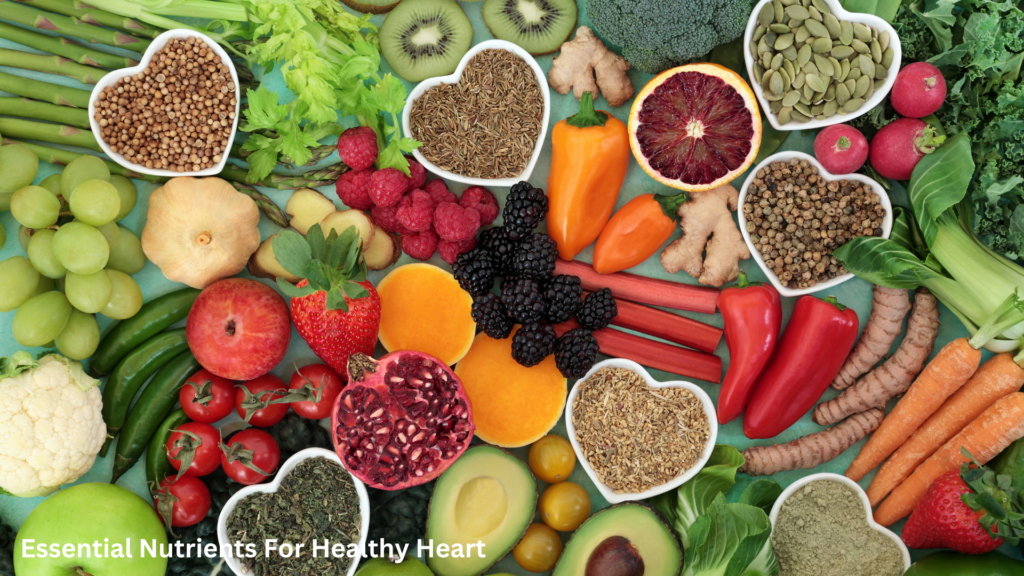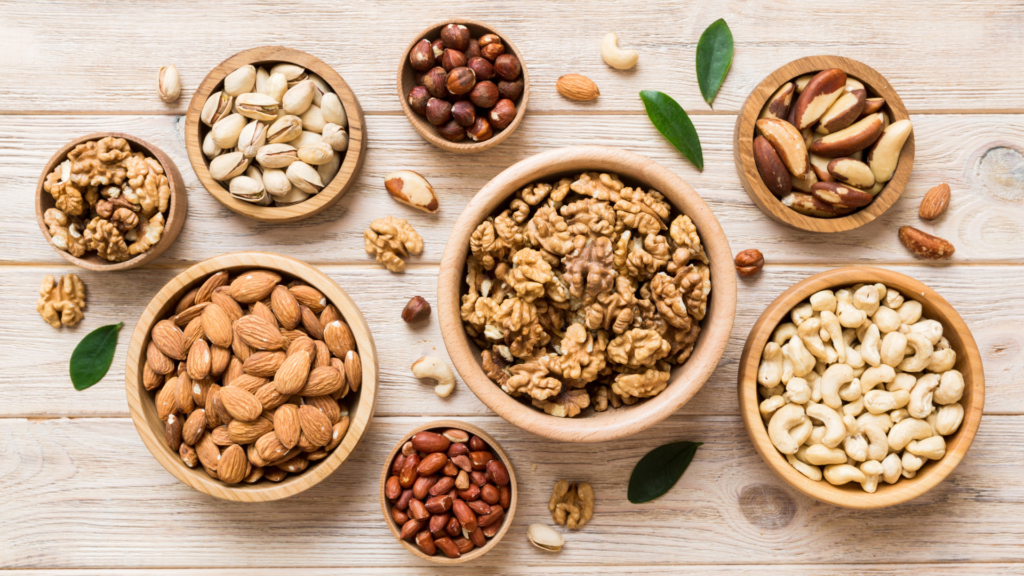Essential nutrients for healthy heart are Omega-3 fatty acids, vitamin D, vitamin E, fibers, magnesium, potassium, coenzyme Q10, folate, or anti-oxidants. A heart-healthy diet includes foods that are low in saturated fat, added sugars, and sodium.
Omega-3 Fatty Acids
Omega-3 fatty acids are the best nutrients for our healthy heart. Omega-3 fatty acids are a type of polyunsaturated fat that are essential for the body and must be obtained from food. They are found in many foods, including:
- Cold-water fish like salmon, tuna, and mackerel
- Dark green leafy vegetables
- Flaxseed oils
- Walnuts
- Chia seeds
- Certain vegetable oils

Vitamin D
Chronic heart failure is often linked to vitamin D deficiency, and very low levels are associated with more negative health outcomes. Low vitamin D is connected to a greater risk of death in those with heart failure, according to the American College of Cardiology.
Magnesium
Magnesium plays a critical role in heart health by regulating the heart’s electrical activity and muscle contractions. Calcium is responsible for exciting the heart muscle, i.e. making it contract, magnesium is responsible for making it relax. As an antagonist of calcium, magnesium regulates heart function, ensuring that the heart beats properly and doesn’t lose rhythm.
Potassium
Potassium is an essential mineral that plays a key role in heart health:
- Heartbeats: Potassium helps trigger the heart to squeeze blood through the body, and it helps control the electrical signals of the heart muscle.
- Blood pressure: Potassium reduces the effect of sodium on blood pressure.
- Hardening of the arteries: Potassium may help prevent the buildup of calcium in the arteries, which can leads to atherosclerosis, or hardening of the arteries.
- Other functions: Potassium also helps muscles move, nerves work, and kidneys filter blood.

Antioxidant
Antioxidant effects, improve endothelial function, reduce blood pressure, lower cholesterol levels, and enhance nitric oxide availability [79]. Reduces oxidative stress, anti-inflammatory effects, improves endothelial function, lowers blood pressure, and enhances nitric oxide production [48].
Fiber
Fiber plays an important role in heart health by lowering cholesterol, reducing blood pressure, and reducing inflammation. The recommended daily fiber intake for children and adults is 14 grams per 1,000 kilocalories. The average fiber intake for US adults and children is less than half of this. To increase your fiber intake, you can eat more fruits, vegetables, and whole grains.
Vitamin E
A hypothesis is that vitamin E may slow the progression of atherosclerosis by blocking the oxidative modification of low-density lipoprotein cholesterol and decrease it’s uptake into the arterial lumen. Basic science and animal studies have supported this hypothesis.

Folate
Folate plays a role in heart health by reducing the risk of heart disease and stroke, and may also help lower the risk of blood clots:
- Lower homocysteine levels: Folate and other B vitamins help convert homocysteine, an amino acid in the blood, into methionine. High levels of homocysteine are a risk factor for heart disease.
- Improves endothelial function: Studies have shown that folate can improve endothelial function, which is a surrogate marker for cardiovascular risk.
- May have other benefits: Folate may also have other benefits, such as antioxidant actions, or direct interactions with the enzyme endothelial NO synthase.
Coenzyme Q10
CoQ10 plays a potential role in the prevention and treatment of heart ailments by improving cellular bioenergetics. It has an antioxidant for free radical scavenging and vasodilator effect which may be helpful in these conditions. It inhibits LDL oxidation and thus the progression of atherosclerosis. CoQ10 is a mitochondrial coenzyme that’s essential for ATP production. It’s important in cells with high energy requirements, like cardiac cells.

FAQs
1. What are the essential nutrients for heart health?
Essential nutrients for heart health include omega-3 fatty acids, fiber, antioxidants (like vitamins C and E), potassium, magnesium, and B vitamins.
2. How do omega-3 fatty acids benefit the heart?
Omega-3 fatty acids help reduce inflammation, lower triglyceride levels, and decrease the risk of arrhythmias, contributing to overall cardiovascular health.
3. Why is fiber important for heart health?
Fiber aids in lowering cholesterol levels and helps regulate blood sugar, which can prevent heart disease by maintaining healthy blood vessels and reducing weight.
4. Which foods are high in potassium beneficial for the heart?
Foods rich in potassium include bananas, sweet potatoes, spinach, avocados, beans, and oranges; these help maintain healthy blood pressure levels.
5. Can antioxidants really protect the heart?
Yes! Antioxidants combat oxidative stress and inflammation in the body which can lead to heart disease; they help keep your arteries clear of plaque buildup.
CONCLUSION
Maintaining a healthy heart is intricately linked to the nutrients we consume daily. Key components such as omega-3 fatty acids, fiber, antioxidants, and essential vitamins play crucial roles in supporting cardiovascular health. Foods rich in these nutrients like fatty fish, whole grains, fruits, and vegetables individuals can significantly enhance their heart health and reduce the risk of heart disease.

